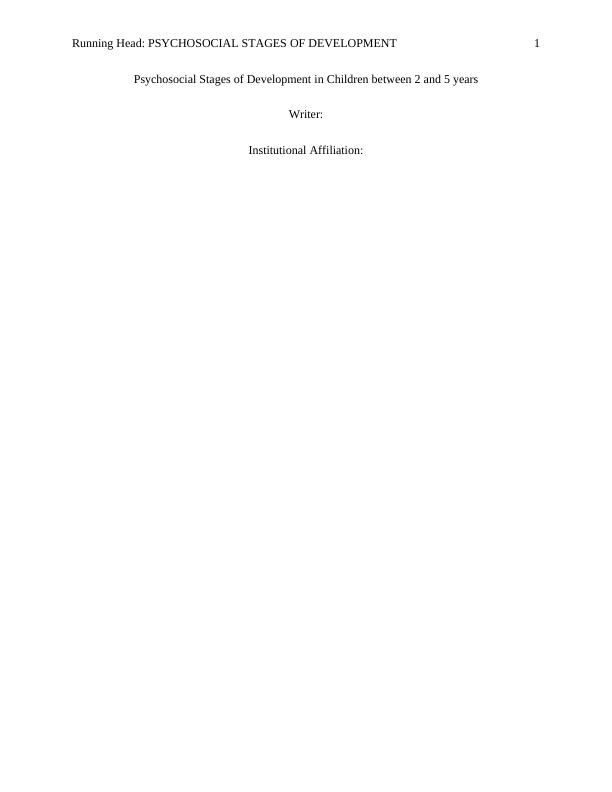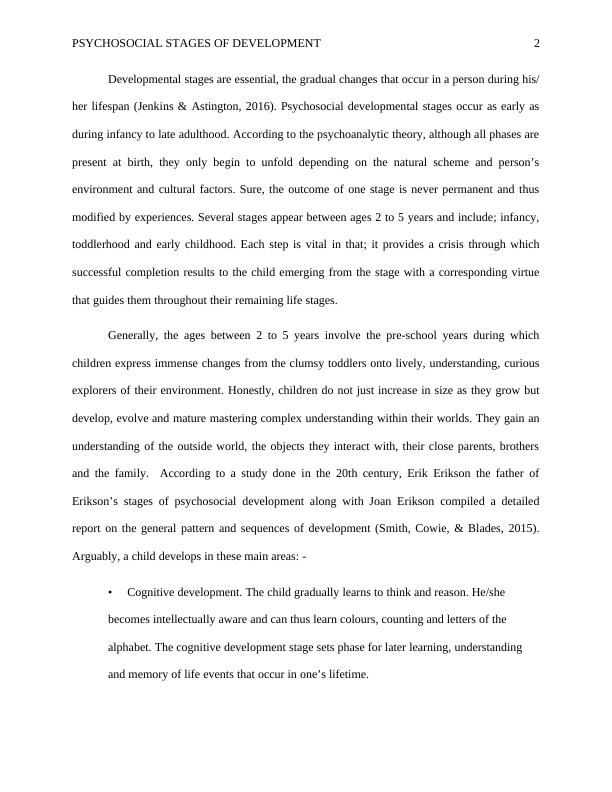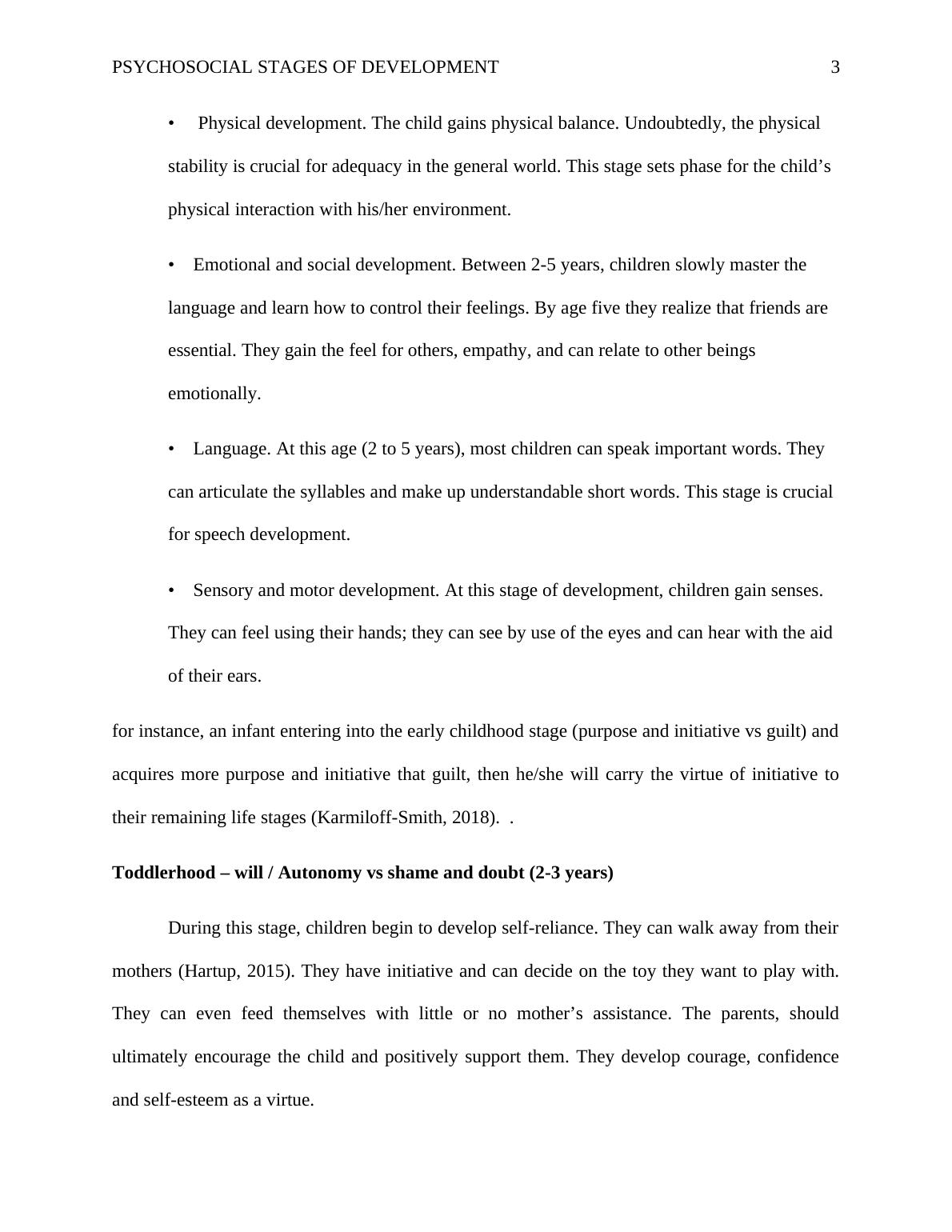Psychosocial Stages of Development - PDF
Added on 2021-04-21
6 Pages1487 Words49 Views
Running Head: PSYCHOSOCIAL STAGES OF DEVELOPMENT1Psychosocial Stages of Development in Children between 2 and 5 yearsWriter:Institutional Affiliation:

PSYCHOSOCIAL STAGES OF DEVELOPMENT2Developmental stages are essential, the gradual changes that occur in a person during his/her lifespan (Jenkins & Astington, 2016). Psychosocial developmental stages occur as early asduring infancy to late adulthood. According to the psychoanalytic theory, although all phases arepresent at birth, they only begin to unfold depending on the natural scheme and person’senvironment and cultural factors. Sure, the outcome of one stage is never permanent and thusmodified by experiences. Several stages appear between ages 2 to 5 years and include; infancy,toddlerhood and early childhood. Each step is vital in that; it provides a crisis through whichsuccessful completion results to the child emerging from the stage with a corresponding virtuethat guides them throughout their remaining life stages. Generally, the ages between 2 to 5 years involve the pre-school years during whichchildren express immense changes from the clumsy toddlers onto lively, understanding, curiousexplorers of their environment. Honestly, children do not just increase in size as they grow butdevelop, evolve and mature mastering complex understanding within their worlds. They gain anunderstanding of the outside world, the objects they interact with, their close parents, brothersand the family. According to a study done in the 20th century, Erik Erikson the father ofErikson’s stages of psychosocial development along with Joan Erikson compiled a detailedreport on the general pattern and sequences of development (Smith, Cowie, & Blades, 2015).Arguably, a child develops in these main areas: - • Cognitive development. The child gradually learns to think and reason. He/she becomes intellectually aware and can thus learn colours, counting and letters of the alphabet. The cognitive development stage sets phase for later learning, understanding and memory of life events that occur in one’s lifetime.

PSYCHOSOCIAL STAGES OF DEVELOPMENT3• Physical development. The child gains physical balance. Undoubtedly, the physical stability is crucial for adequacy in the general world. This stage sets phase for the child’s physical interaction with his/her environment.• Emotional and social development. Between 2-5 years, children slowly master the language and learn how to control their feelings. By age five they realize that friends are essential. They gain the feel for others, empathy, and can relate to other beings emotionally.• Language. At this age (2 to 5 years), most children can speak important words. They can articulate the syllables and make up understandable short words. This stage is crucial for speech development.• Sensory and motor development. At this stage of development, children gain senses. They can feel using their hands; they can see by use of the eyes and can hear with the aid of their ears.for instance, an infant entering into the early childhood stage (purpose and initiative vs guilt) andacquires more purpose and initiative that guilt, then he/she will carry the virtue of initiative totheir remaining life stages (Karmiloff-Smith, 2018). . Toddlerhood – will / Autonomy vs shame and doubt (2-3 years)During this stage, children begin to develop self-reliance. They can walk away from theirmothers (Hartup, 2015). They have initiative and can decide on the toy they want to play with.They can even feed themselves with little or no mother’s assistance. The parents, shouldultimately encourage the child and positively support them. They develop courage, confidenceand self-esteem as a virtue.

End of preview
Want to access all the pages? Upload your documents or become a member.
Related Documents
Human Development Across the Lifespanlg...
|8
|2053
|361
GROWTH AND DEVELOPMENT OF EARLY CHILDHOOD.lg...
|10
|2843
|1
Development of psychosocial skills in childrenlg...
|6
|1727
|80
Comparative Study of Erikson's Psychosocial Theory and Maslow's Hierarchy of Needslg...
|8
|1818
|312
The Psychosocial Stage of Toddlerhood: Autonomy, Trust, and Emotional Developmentlg...
|6
|1435
|93
Psychosocial Development in Early Childhood: A Case Study of Julielg...
|7
|1914
|281